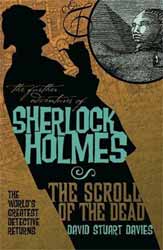|
Click here to return to the main site. Book Review
In this fast-paced adventure, Sherlock Holmes attends a séance in order to unmask an unscrupulous impostor posing as a medium. There he meets Sebastian Melmoth, a man hell-bent on discovering an ancient Egyptian papyrus that he believes holds the key to eternal life. It is up to Holmes and his faithful friend Dr Watson to use their deductive skills to stop Melmoth or face disaster... Originally published by Calabash Press in 1998, this is one of two David Stuart Davies novels in Titan’s initial batch of Sherlock Holmes reprints (the other one being The Veiled Detective). Titan is steering clear of Davies’s earlier novels The Hentzau Affair and The Tangled Skein for now, presumably because those two are still in print, having been reprinted in recent years by Wordsworth Editions. However, The Scroll of the Dead is due for an airing. Combining the popular appeal of Egyptology and the world’s greatest consulting detective, this book sees Holmes facing apparently supernatural forces. This is not unknown territory for the character (as both The Hound of the Baskervilles and The Adventure of the Sussex Vampire had paranormal themes), but the notion of life after death has a particular resonance given the life story of Holmes’s creator, Sir Arthur Conan Doyle. Following the deaths of several close family members in the first two decades of the 20th century, Conan Doyle embraced spirituality, including séances of the kind depicted in the opening pages of this novel. In effect, Davies pits the scientific method of Conan Doyle’s most famous creation against the beliefs that Conan Doyle desperately clung to in later life. I don’t think I’m giving too much away if I reveal that scientific method wins through in the end - but not before Watson and even Holmes have experienced shocks and surprises that challenge their assumptions. The author certainly knows his subject, having penned several works of fiction and non-fiction about Holmes, including Holmes of the Movies and Bending the Willow: Jeremy Brett as Sherlock Holmes. At the time of this book’s original publication, Brett’s performance as Holmes was the one freshest in the minds of most Sherlockians. Accordingly, the detective in The Scroll of the Dead is more akin to Brett’s moody Holmes (complete with abrupt bursts of laughter) than the more amiable character personified by Basil Rathbone. Despite briefly appearing as though it might involve a trip to Egypt, the story never actually strays beyond British shores, though our heroes do venture outside of the home counties, to the Lake District. There the plot briefly takes on a macabre quality similar to that of another enduring 19th-century fiction, Frankenstein, before the final dramatic confrontation with the villain. All in all, this is dead good entertainment. 8 Richard McGinlay |
|---|


